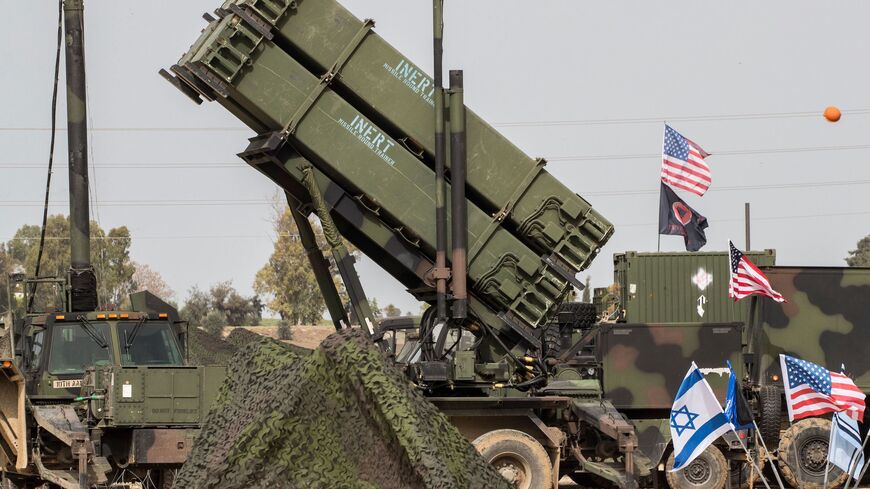The United States and Israel are set to kick off the largest war games ever held between the two nations’ militaries on Monday as the Biden administration’s attempts to negotiate a return to the 2015 Iran nuclear agreement have faltered and Tehran has turned to Russia to shore up its own defense capabilities.
Four nuclear-capable US B-52 bombers, F-35 stealth fighters, F-15s, F-18s and an aircraft carrier strike group led by the USS George H.W. Bush are among the 142 US and Israeli aircraft and 12 warships participating in the weeklong event, dubbed Juniper Oak 23.2.
Some 6,400 US personnel and more than 1,100 members of the Israel Defense Forces are set to take part, a senior US defense official said.
An integrated US-Israeli command will oversee long-range air coordination over the Mediterranean, including aerial refueling and electronic warfare attacks, and culminating in a live-fire exercise involving “suppression of enemy air defenses” and simulated strikes on strategic targets, the senior US defense official said.
The drills will also include US special operations and ground forces, combat search and rescue teams and Space Force assets. Some 180,000 pounds of munitions, including laser-guided bombs and rockets from four US HIMARS systems, will be expended, the senior defense official said.
The commander of all US forces in the Middle East, Army Gen. Michael “Erik” Kurilla, described the event as “a combined joint all-domain exercise which improves our interoperability on land, in the air, at sea, in space and in cyberspace with our partners, enhances our ability to respond to contingencies and underscores our commitment to the Middle East.”
“We are committed to strengthening military-to-military relations throughout the region,” Kurilla said in a statement on Monday.
Why it matters: CENTCOM commander Kurilla likened the exercise to others that the United States “routinely conducts” with regional militaries. But a senior US defense official speaking to reporters on condition of anonymity suggested it will go far beyond that.
“This will be the most significant exercise between the United States and Israel to date,” the official said, adding, “We couldn’t really find anything that comes close.”
The senior official stressed that the drills are not specifically oriented toward Iran, but rather designed to test the US military’s ability to quickly surge forces into the Middle East and link up with the Israeli military to respond to major threats together.
Nonetheless, Pentagon officials say they expect Iran and other US adversaries will take notice.
“It’s a signal to competitors and adversaries that it's not just the United States, or it's not just Israel … but actually it's a coalition they are likely to face and that that coalition is highly capable and highly interoperable,” the senior US defense official said.
“It would not surprise me if Iran sees the scale and the nature of these activities and understands what the two of us are capable of doing.”
Long-range strikes. The unprecedented display of force comes as more than two years of diplomatic efforts by the Biden administration to negotiate a mutual return to the 2015 pact limiting Iran’s nuclear program appear to have bottomed out.
The exercise, which Pentagon and CENTCOM officials organized over the course of just a few weeks in coordination with the previous Israeli government, comes amid signs of impatience in the new coalition led by Prime Minister Benjamin Netanyahu over reports that the United States has continued to seek a negotiated solution with the Islamic Republic.
“Iran will not be allowed to get a nuclear weapon, period,” the senior US defense official said.
“Our preference remains to resolve that diplomatically. That’s been difficult because the JCPOA is on pause,” the official said.
Flashback. A decade ago, a push by members of Netanyahu’s previous government for conventional long-range strikes against Iran’s nuclear sites raised alarm bells in Washington, accelerating the Obama administration’s pursuit of diplomatic talks with Tehran that eventually led to the 2015 accord.
The nuclear deal was subsequently abandoned by the administration of President Donald Trump, leading Iran to ramp up its enrichment.
Since coming to office in January 2021, President Joe Biden has pursued close coordination with Israeli officials in an effort to prevent disagreements over how to hold back Iran's nuclear program from spilling over in public.
National security adviser Jake Sullivan visited Israel last week to coordinate on the issue with top security officials in Netanyahu’s government. Sullivan previously said the trip would enable the two sides to resolve “any differences we have on tactics, the same way that we have over the course of the past two years.”
Narrowing window? Last month, the White House accused Iran of building a “full-fledged defense partnership" with Russia amid the war in Ukraine and said Tehran would likely receive Su-35 fighter jets by this year, as well as possible air defenses. Meanwhile, Iran has continued to enrich uranium at underground sites.
Israeli officials have pressed for exercises like Juniper Oak for years, but US officials say they’ve only become possible since Israel’s incorporation into US CENTCOM’s region of responsibility in 2021.
The defense official said the exercise was scheduled after CENTCOM commander Kurilla “made a persuasive argument that we had an opportunity to dial this up.”
Dan Shapiro, who served as US ambassador to Israel during the Obama administration, told Al-Monitor that the expanded military coordination “signals to Iran, the Gulf States and Israel that President Biden is dead serious when he says he will not permit Iran to get a nuclear weapon.”
Shapiro, now a senior fellow at the Atlantic Council, said Juniper Oak “marks a shift to a deterrent strategy that may be necessary if Iran remains a threshold state without the restraints of a nuclear deal."
“It also provides important leverage that could facilitate an eventual return to diplomacy,” he said, adding that the depth of cooperation required by the massive exercise can "perhaps make it less likely that one acts independently without close coordination with the other.”
Confidence-builder. Pentagon officials say Juniper Oak is also aimed to convince Arab leaders that the United States can rapidly deploy major military assets into the Middle East on very short notice, even as the bulk of Washington’s forces are concentrated in Europe and the Pacific to deter Russia and China.
Only 30-35,000 US troops remain in the Middle East, down from more than 200,000 during the height of the US wars in Iraq and Afghanistan, the senior defense official said. The Biden administration has struggled to dispel concerns among leaders in the region that the reduced footprint means Washington is not living up to its commitments there.
“We think this exercise demonstrates that we can walk and chew gum at the same time,” the official said. “Frankly, no other military on earth could do this.”
But the image projected by the Biden administration of a latent US-led regional coalition is premature, some analysts and former officials say.
Arab military officials were not invited to observe or participate in this week’s exercise, two US defense officials said, in the latest sign of Washington's sensitivity to wariness among Middle Eastern leaders about being perceived as part of a US- and Israel-led bloc against Iran.
Military officials from the GCC countries, Egypt, Iraq and Jordan are among those to be briefed by US officials following this week’s exercise, the senior defense official said.
Kurilla hinted at further integration with Arab militaries on Monday, saying, “The lessons learned during these exercises are exportable to our partners across the region.”
Know more: The Israeli Air Force is seeking new advanced F-15 EX aircraft from the United States, Breaking Defense reported last week, as it seeks to extend its strike range and payload capabilities in the coming years.
This story has been updated and edited for clarity.







